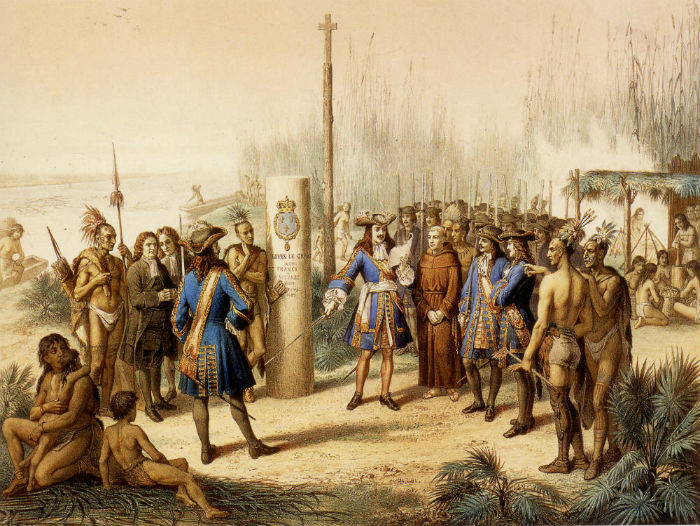
A century of French heritage
Louisiana was part of New France. Given that its territory was immense extending from the Gulf of Mexico to the Great Lakes and from the Appalachian Mountains to the Rockies, it would be more appropriate to refer to it as “Colonial French Louisiana”.
In 1673, explorer Louis Jolliet and Jesuit Father Jacques Marquette were the first Europeans to explore the Mississippi River, from the Great Lakes to the mouth of the Arkansas River where they turned around. It is only in 1682 that the French took possession of what would become the huge Louisiana territory, over which their influence lasted for more than a century. The 1803 Louisiana Purchase Treaty between France and the United States ended for ever Colonial French Louisiana.
Today, behind any existing names of French origins, historical traces of this rich heritage can be found in the memories of times past of these early American communities which bloomed throughout the Mississippi drainage basin. The aim of this book is to enlighten them. Yet, a contextual reminder is needed beforehand. The history of Colonial French Louisiana is first and foremost that of the Mississippi River, the spine of America uniting the Lower and Upper Mississippi Valley (Lower and Upper Louisiana). It is also that of the waves of migrants which succeeded one after another in Lower Louisiana until the beginning of the 19th century. The francophone portraiture of the people of Louisiana was shaped by these human migrations.
The historical reminder has prominence on the website of Jean-Marc Agator in the article Colonial French Louisiana (in French).
Important precision: the historical reminder in the link above mentions the arrival of the Acadian refugees in Lower Louisiana as early as 1764. Indeed, their history and timeline are inseparable from that of Colonial French Louisiana. This work barely addresses the Acadian communities. This is because another travel book is fully dedicated to presenting Acadia and its diverse communities on account of the coherence and richness of their history: see On the roads of the Acadian people.
Historical capsules
The historical capsules provide a side perspective often crossing cultures and symbols.
Cat Island, its raccoons, its fort and its gold
The Isle of Cats (Cat Island today) in the Gulf … Lire la suite
Each image tells its story
The numerous French heritage festivals, often called Rendez-Vous, revitalize a … Lire la suite
Firearms fairs and the reputation of the French rifles
Lewis and Clark have often referred to “fusils” (rifles) that … Lire la suite
Historic 1699 Iberville Stone
The “Iberville Stone” is one of the oldest colonial relics … Lire la suite
Southern Saskatchewan and Alberta sold to the United States by Bonaparte
Thomas Jefferson, the third president of the United States, and … Lire la suite
The French contingent of the Lewis and Clark expedition
The Louisiana Purchase Treaty, signed at the Hotel Tubeuf in … Lire la suite
The horse and the Native American culture
While canoeing the Mississippi in 1682 Robert Cavelier de La … Lire la suite
The traditional indigenous education of native children
Aniyunwiya, the eldest of the tribe, figuratively taught the children … Lire la suite
Who are the Creoles of Colonial Louisiana
In North America the inhabitants of Louisiana, Canada, and Acadia … Lire la suite